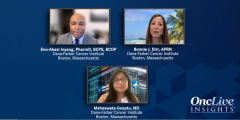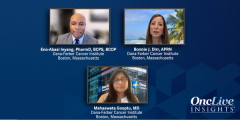
GVHD Incidence and Pathophysiology
Mahasweta Gooptu, MD, reviews statistics on graft versus host disease and explains the desired graft versus leukemia effect.
Episodes in this series

Transcript:
Bonnie J. Dirr, APRN: What statistics does your institute see for graft-vs-host disease [GVHD] for patients currently? As well as the possibility and desire for a graft-vs-[leukemia] effect, or GVL effect, as noted in the community.
Mahasweta Gooptu, MD: I would say that based on 5-year data, which again is rapidly changing because of the advent of posttransplant cyclophosphamide, the numbers that we quote mirror the national statistics, really, and it’s what we see at the institute. So, rates of acute graft-vs-host disease [GVHD] of any grade would be in the 30% to 40% range, and severe acute GVHD would be approximately 10% of those who develop acute GVHD. In terms of chronic GVHD using [tacrolimus]/methotrexate, the numbers are in the 40% to 45% range, any intensity of chronic GVHD. But once again, the severe forms are [found in] approximately 10% of those who get it. With changing paradigms in the GVHD prophylaxis field, these numbers are changing. But I would say this is the historical perspective.
Bonnie J. Dirr, APRN: In terms of the desire for a graft-vs-[leukemia] effect?
Mahasweta Gooptu, MD: We always do the transplant with the expectation that there will be a graft-vs-leukemia effect. And interestingly, GVHD prophylactic regimens, whereas they have a huge impact on nonrelapse mortality and toxicities from the transplant, none of them have really been shown in a consistent manner to affect relapse rates, except CD34 selection or ex vivo T-cell depletion from the graft before it’s infused, which historically has been associated with higher relapse rates. Other than that, it doesn’t seem to affect the graft-vs-leukemia effect.
Bonnie J. Dirr, APRN: Thank you, Dr Gooptu.
Transcript edited for clarity.


































